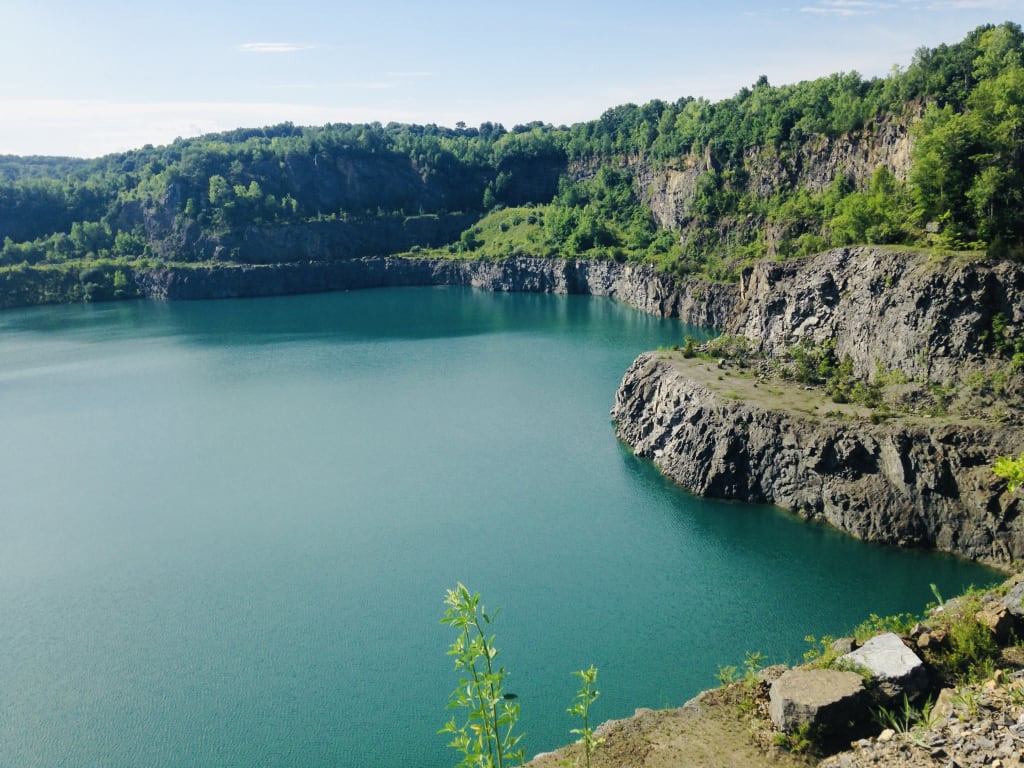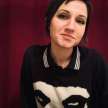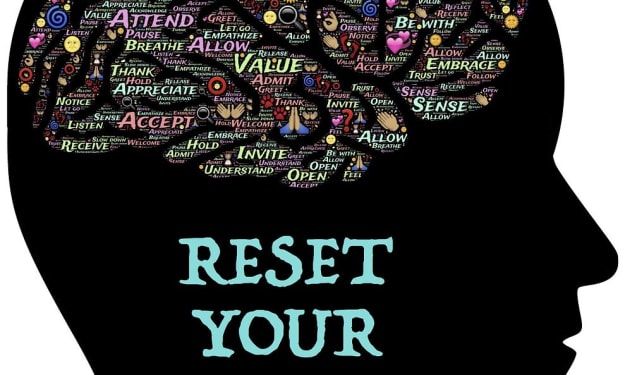Kill Yourself:
Living, Quitting, and Creating on Purpose

“The only thing that punk rock should ever really mean is not sitting ‘round and waiting for the lights to go green.” —Frank Turner
I was exactly where I should have been on the afternoon I jumped: halfway through a Masters Degree, about to begin an internship, and working three public service jobs simultaneously. My boyfriend had just moved into my apartment and the feeling of being “settled” was just starting to sink in.
Now that I was in my twenties it felt appropriate, mature even, to grind away the day and night and wear sleeplessness with pride. But moreover, it seemed normal. My father had driven to work at 4:00 AM for 25 years, only returning at night to retreat to his home office and get started on his other job—the stuff that really paid the bills. Now it was my turn.
The nobility of my work in foster care added an even deeper layer of meaning, and I felt my self-worth balloon in relation to how many families I visited each week, how many ice cream cones I bought for abandoned kids, and how many miles I put on my car. It seemed to be filling some empty space in me.
But some days on my way to work, I would play a favorite punk album and sink into memory: epic sing-a-longs in dark rooms with sweaty strangers. I’d remember the thrill of wandering Berkeley, California at night, pen in hand, and letting the poetry flood through me. I’d feel the thrill of sharing my words with other artists, talking free verse and Tom Waits, and chapbook titles.
But that was rare. I had grown up.
By 25 I had built an unmistakable identity. Ambitious and tough, I was proud that my accomplishments and exterior image spoke of tenacity, unexpected power, and passion. Like most who plunge full-hearted into social services, my passion had formed in direct response to a lifelong series of personal shit-storms, and my mission was to use my experiences to help others. And here I was, doing it, making the difference.
At work I’d talk to clients about the importance of holistic health, drawing out their Life Circle, and stressing the importance of following your bliss and all that new-age shit. I’d smile and shake hands and say things like, “If it doesn’t make you happy, don’t do it.”
And I’d feel like a fraud.
I functioned in eternal Helper Mode, but I was tired, numb. I longed just to find a sunny spot and read a book.
Unchecked, it’s easy to live and die this way.
So when I reached the top of the rock cliff 40 feet above the calm blue quarry, I wasn’t expecting the invisible force that pulled me forward, though I should have been—my rebellious spirit had been waiting for the right moment to rescue me.
To this day, the line between accident and intention is blurry. I had scaled the same precipice many times before, watching from the grassy patches as others ran and leapt and landed feet-first in the water with glee. My deep phobia of water was powerful though, and while my man encouraged me each time to face my fear, I was always happy to climb back down the rocky slope to meet my friends at the shore.
But this time was different; I was begging for an alternate ending. It wasn’t that I was asking for death, or even feeling particularly self-destructive. It was more like a deep internal urgency had hitched itself to the late summer air and all at once, I knew I was supposed to take the plunge, to surrender myself to gravity, to water and earth.
The linguistic origin of the Japanese term kamikaze is something like “divine wind.”
On this sunny September day, my man waiting in the water below, I wasn’t thinking about my lifelong fear of drowning, or of my work cell phone, which was definitely ringing in the car a few miles back through the woods. I wasn’t thinking of anything. But my heart was pounding up my throat. My hands were sweating and every time I revved myself up to make the short run to the edge, my stomach dropped and my feet felt stuck in mud.
For the final minute on top of that cliff I felt the weight of my entire life—the straight A’s, the career ladder, the desperate drive to please my parents, the pressure, the self-denial—holding me in place. Still sirens were ringing in my head and something wild was screaming, begging me to move, a divine wind.
I took one last shaking breath, willed my right foot forward, then my left, pushed my black Vans off the edge, and leapt into empty air.
…
In order to land safely in the quarry, a diver must maintain perfect aim and balance, remaining upright, so the impact of 12 feet of water is absorbed through the feet. Instead, closing my eyes and curling instinctively into fetal position, I hit the water face first. The impact shattered the bones in my face, causing my eye to break through the socket—muscles trapped in fissures, vision lost, reality gone.
The last thing I remember from my first life—the feeling of a heated blanket in a dark hospital room. Paul, my man, my motivator, and guardian angel, sat beside me in a metal folding chair for hours. When the painkillers finally took over and I sunk into oblivion, the release brought tears to my eyes—stillness, relief, ecstasy. I whispered to Paul, and to myself, “Thank you for killing me.”
It was a sweet farewell from my first self, and a grateful nod from a new me.
…
The intensive recovery process prohibited work of any kind. In a novel medical approach the surgeon had inflated a balloon within my sinus cavity, reconstructing my face and ensuring my vision could return to normal. But the delicate procedure deemed most normal daily functions dangerous, if not impossible. Worse, the hardcore regimen of painkillers and antibiotics left me covered in hives, photosensitive, exhausted, and constantly nauseous. Still, internally I was giddy, on fire, new.
In a blur of exhilaration and terror, I was forced to start over. To examine my swollen face and black eyes every morning and decide how to spend each day. I was Dobby holding a sock—shocked, ecstatic, but unsure where to start.
So I found a sunny spot and read a book.
And every day, while the world worked, and waged war, and worried about identity and success, and all the other familiar mental prisons, I drove to cafes and read. I read and read and the words poured back out of me. And I contacted venues and bands to set up shows, and I found a cute little house outside of Woodstock for Paul and me to feel like ourselves.
My grad school granted me a Leave of Absence. My internship was filled by another MSW student and my foster care caseload was divided amongst my coworkers. By force, I was freed.
That year I began therapy with a psychologist who not only helped me safely explore past traumas, but guided me into my second life with compassion and empowerment.
In the spring, feeling confident in my own abilities as a social worker and student, I dropped out of grad school for good. Finally, I shed the borrowed beliefs that had led me to max out student loans and wear down my true self in pursuit of institutionalized validation. Life itself was suddenly enough.
…
I don't recommend jumping off a 40-foot cliff in the height of your professional climb. But I beg you—yes you, exhausted social worker, stressed out salesperson, dejected teacher, grown up punk, secret poet—to give yourself permission to pause.
Question who you’re living for and who you work for everyday. Question your values—are they really yours? Deconstruct your identity. Have you been carrying the same stories about yourself for decades (“I’m the hard worker, the overachiever, the struggling professional”)? Are you making a difference in the way that only you can? What will it take for you to push pause? Reset?
Who would emerge if you killed your current self?
Liberation looks different to everyone, and it’s always evolving. I still have a day job. I still get rejection letters from publishers, and I have bouts of paralyzing depression. My parents may forever be disappointed that I’m not a famous journalist. But there’s a different kind of dignity and drive that’s born when you take your life back from Default Mode.
When your life belongs to you alone, every struggle has a purpose and every triumph is yours to celebrate. Being able to use your innate gifts to do work that fires you up automatically multiplies your impact on the world. So what’s the thing you excel at without trying? Start there. Pretend the light has just gone green.
Now take the leap. Listen to the wild voice and trust the motion it compels. Let your old self die, along with the dogma and pressures that have worked on your spirit all these years. If you want it, there’s a whole new world, and a better You, waiting to be born.
Then, curate your new life—ditch the jobs that suck your soul out. Purge the toxic relationships, even if it means drawing a thick and terrifying line in the sand before close family and friends. Just don’t neglect to fill the void. Fill it with art and music or podcasts on self-improvement or long late-night talks with people you admire.
If you can’t find the scene you’re looking for, make it. If you’re aching for more, build it. If you find yourself ready and waiting for the moment, it’s already here. Jump.
About the Creator
Kristina Sarhadi
NY native. Social Worker. Reiki Master. Certified Holistic Health Counselor. Consciousness Engineering Nerd. Punk Enthusiast. Therapist. Friend to the Friendless. Guidance Counselor to the Brave. @kingstonreiki newleafholistichealth.com







Comments (1)
Thank you for reading, and for all the love. I wish the same heartskips for you.